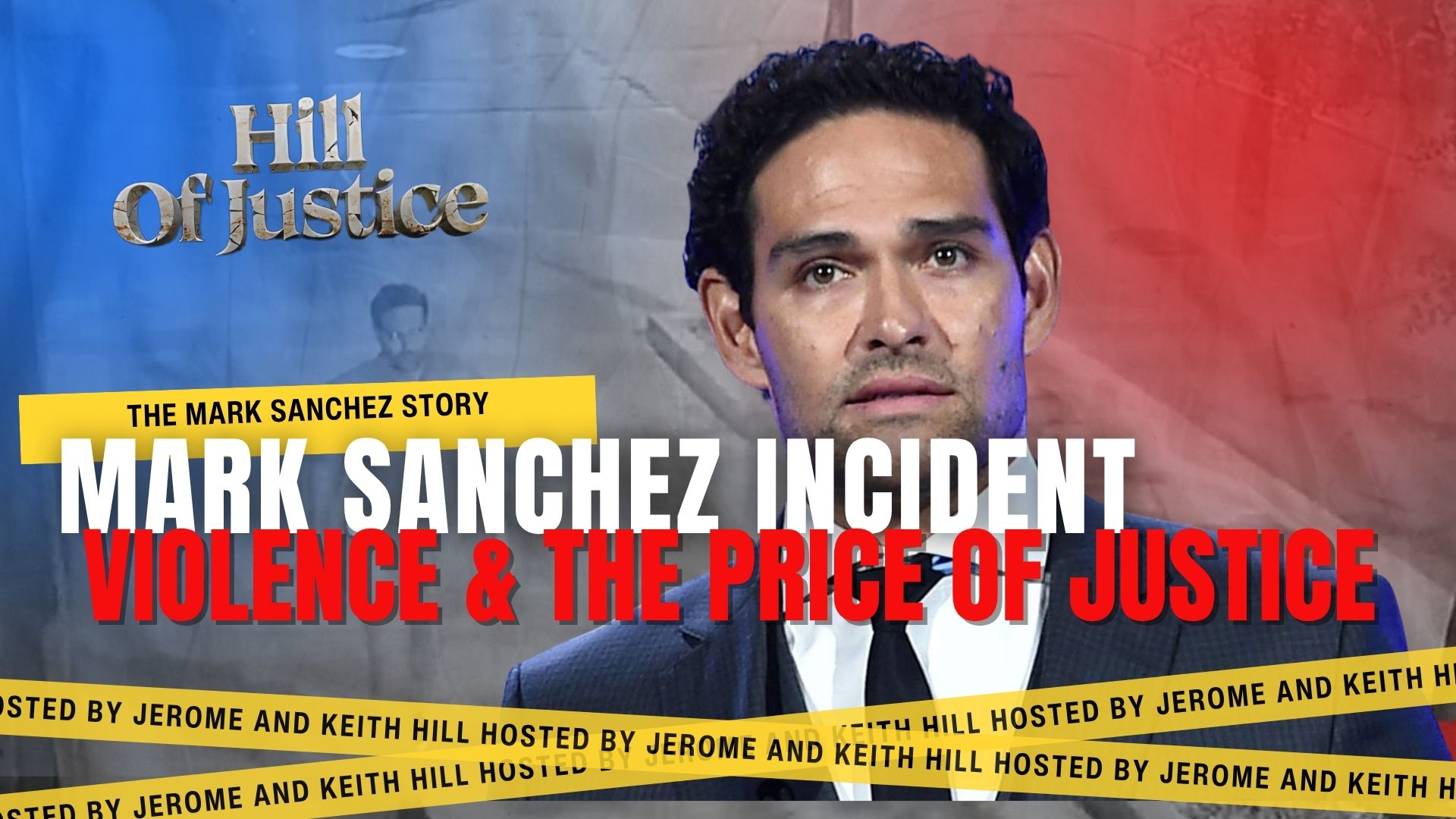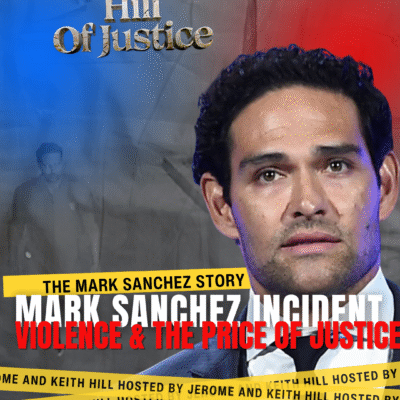
This Episode
Introduction: A Celebrity’s Fall from Grace
When news broke that former NFL quarterback Mark Sanchez was involved in a violent late-night altercation in Indianapolis, the nation’s attention quickly shifted from football highlights to court documents. What began as a simple parking dispute spiraled into a stabbing, a hospital stay, and a full-blown legal storm — the kind only celebrity status can ignite.
But beyond the tabloid headlines lies a deeper question:
Does wealth still determine justice in America?
That’s the question Hill of Justice hosts Jerome Hill and retired Sheriff Victor Hill take head-on in this week’s episode, exploring how celebrity, income, and influence shape the outcomes of criminal cases — and whether bond reform is truly leveling the playing field or creating new ethical problems.
The Indianapolis Incident: Midnight Mayhem
According to reports, the altercation began over something as trivial as a parking spot. Witnesses say a confrontation between Sanchez and a 69-year-old man escalated quickly, ending with the NFL star stabbed and hospitalized.
The public reaction was immediate. The internet buzzed with theories, while legal analysts zeroed in on one detail — Sanchez’s $300 bond. For a felony assault case, that number raised eyebrows and reignited national conversations about how the rich and famous navigate the criminal justice system differently than the rest of us.
The Debate: Bond Reform or Celebrity Privilege?
When the average person hears “bond reform,” they think of fairness — a system designed to prevent the poor from languishing in jail simply because they can’t afford bail.
But what happens when the wealthy benefit most from those same reforms?
As Victor Hill points out in the episode, “We have a tendency to punish people for being rich, but we also sometimes reward them for it.” It’s a paradox that defines many modern legal debates. Should bond amounts be based on a person’s income? Should fame or visibility make someone a lower flight risk? Or does wealth still act as an invisible get-out-of-jail card?
Income-Based Fines: A European Model Under the Microscope
Across the pond, several European countries like Finland and Denmark have implemented “day-fine” systems — penalties that scale according to an offender’s income. The idea is simple: a fine should sting equally for everyone, whether they earn $30,000 or $3 million.
But as Jerome Hill challenges in the discussion, “At what point does fairness become financial discrimination?”
If a speeding ticket costs a millionaire $100,000 but only $100 for a teacher, does that uphold justice — or twist it?
The hosts agree that context and discretion matter most. A flat, one-size-fits-all approach might sound fair, but the reality is often more complicated when real lives and reputations are on the line.
The Hidden Consequence: Employment and Reputation
For Sanchez, the courtroom may not be his biggest battle — it’s the court of public opinion.
Fox Sports quickly distanced itself from the controversy, and as Victor Hill notes, “If he worked at Burger King, they’d tell him to clock back in the next day. But in entertainment, your career ends before your trial begins.”
This raises a broader ethical issue:
Should someone lose their livelihood before being proven guilty?
Or are morality clauses — common in media and sports contracts — an unfair extension of punishment before conviction?
In Sanchez’s case, the fallout has already begun. Sponsors and networks are retreating, and his future in broadcasting now hangs in the balance.
Flight Risk, Fairness, and the Future of Reform
Throughout the episode, the hosts keep returning to one central idea: justice should be based on risk, not revenue.
A bond isn’t meant to punish — it’s meant to ensure someone shows up for court. Yet, when the number becomes symbolic rather than practical, it exposes deep cracks in how our legal system values people differently based on income, fame, or perception.
As Jerome Hill concludes, “The system must guarantee fairness, regardless of who you are or how much you make. Otherwise, justice becomes a privilege — not a right.”
Final Thoughts: The Human Cost of the Headlines
The Mark Sanchez case is more than just another celebrity scandal. It’s a mirror reflecting how the U.S. justice system struggles with equality — not just between rich and poor, but between the famous and forgotten.
It forces us to ask uncomfortable questions:
-
Should justice have a price tag?
-
Are we punishing success instead of ensuring fairness?
-
And when the spotlight fades, who’s truly held accountable — the system, or the individual?
🎧 Watch or Listen Now
👉 Catch the full episode on YouTube:
Mark Sanchez Indianapolis Incident: Celebrity Violence, Bond Reform & the Price of Justice
🎙️ Also available on Spotify, Apple Podcasts, and all major platforms.
📲 Follow @HillOfJustice for more deep dives into justice, ethics, and the cases the mainstream won’t touch.
🎬 Produced by Juming Delmas Studios | www.jdelmasstudios.com
February 2026 M T W T F S S 1 2 3 4 5 6 7 8 9 10 11 12 13 14 15 16 17 18 19 20 21 22 23 24 25 26 27 28

Quick Links
© Hill of Justice 2025. All Rights Reserved. Powered by Juming Delmas Studios



Be the first to leave a comment